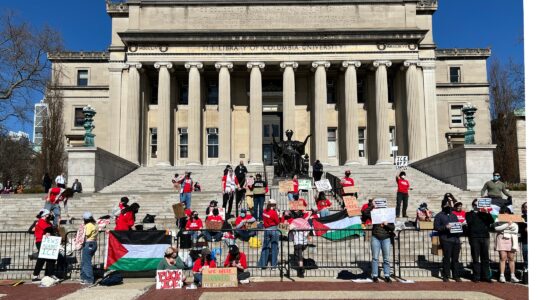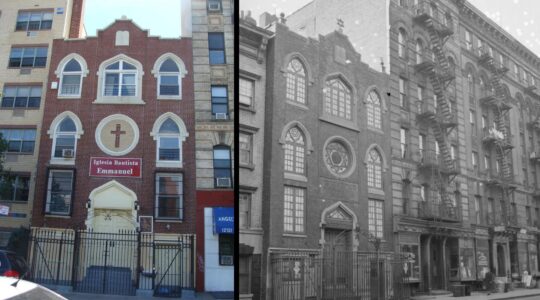Efforts to eliminate anti-Semitic language and themes from the world’s most famous Passion Play in time for its millennium production are not going smoothly. So says an unhappy Rabbi Leon Klenicki, director of interfaith affairs for the Anti-Defamation League, who returned to New York last week from unsuccessful meetings in the German village of Oberammergau trying to persuade the producers to make changes in the production, which will run May 22-Sept. 29, 2000.
"The latest draft of the ‘Passion Play’ still portrays very negative images of Jews and Judaism in the first century, accusing Jewish leadership for Jesus’ death [and] portraying Judaism as void of meaning and spiritually decadent," Rabbi Klenicki told The Jewish Week.
He says the current draft will "invite, if not incite anti-Semitism."
The Bavarian town of Oberammergau is home to the 350-year-old, once-a-decade "Passion Play": a theatrical performance depicting the events of the death of Jesus based on New Testament texts.
The Passion, or suffering, of Jesus is central to Christians. For 1,000 years the Easter-time dramas, produced around the world, have been used to foment hatred against Jews, even leading to pogroms, by blaming the Jews for killing their God.
But with significant improvements in Catholic-Jewish relations since 1963 (particularly in the last 20 years under the guidance of Pope John Paul II) Jewish interfaith experts have been trying to persuade Christian producers to revise the scripts that pin Jesus’ death on Second Temple Jewish religious and political leaders.
A Jersey City, N.J., production has been hailed by Jewish leaders as a model for eliminating problematic references. But Rabbi Klenicki says Oberammergau producers, whose play attracts tens of thousands of tourists, are resisting a series of script changes he requested last July.
"I’m very upset about this," says Rabbi Klenicki. "They are primitive in their approach. They are repeating the teaching of contempt for the Jewish people and Judaism, that is, the accusation of deicide."
He also argues that producer Otto Huber is violating the Catholic Church’s own guidelines calling for the elimination of anti-Semitic language and concepts from Passion Plays: even it if means ignoring sacred Christian texts.
"I told them you are committing treason to your own faith. The Pope said don’t use certain texts in a Passion play that are offensive," Rabbi Klenicki said.
Their reaction, he said, was silence.
The Oberammergau play dates back to 1633, when the region was ravaged by the Black Plague. Townspeople vowed to God that if they were spared disease and death, they would commemorate the story of Jesus’ suffering and death every 10 years with a theatrical re-enactment. Town records show that the plague caused no more deaths in Oberammergau.
Today, about 1,500 townspeople dress up in biblical garb to act in the play; no professional actors are allowed.
While Huber accepted 12 of 24 ADL recommendations, Rabbi Klenicki said the producer kept key dialogue portraying Roman Governor Pontius Pilate as the dupe of Temple High Priest Caiphas and the Sanhedrin, the legendary 71-member Jewish parliament in Jerusalem. But Rabbi Klenicki noted that "the high priest was always nominated by the Roman proctor."
The German producers accepted such ADL proposals as eliminating the phrase from Matthew 27:25 that Jews said "the blood [of Jesus] be upon us"; replacing "Old Testament" with "Hebrew Bible"; calling Jesus "rabbi" instead of "master" to stress his Jewishness; and deleting any mention of the famous 30 pieces of silver given to Judas by Jewish authorities to betray Jesus.
But the producers ignored other ADL requests to "clarify the pluralistic reality of Jewish society in the first century"; portray Pontius Pilate as "an ambitious bureaucrat who has no respect for anybody"; avoid the presentation of an opposition between (Jewish) law and (Christian) love; and stop presenting Jewish characters as stereotyped villains.
Rabbi Klenicki said the play also depicts the Jewish power establishment "as part of a political and theological conspiracy to destroy early Christianity."
He argues that the anti-Jewish language about Jesus’ death found in the Gospels of John and elsewhere must be seen in context: written about 40 years later when the Jewish followers of Jesus struggled against Rabbinical Judaism during the chaotic period after the destruction of the Second Temple.
"This is not a question of artistic freedom," the rabbi said. "There is a moral obligation not to produce that which will hurt people," for instance depicting Caiphas with horns and a long nose, like a devil.
Eugene Fisher, director of Ecumenical Affairs for the National Conference of Catholic Bishops in Washington, told The Jewish Week that he would "take seriously" Rabbi Klenicki’s concerns.
"Certainly, playing Pilate as an innocent, gullible fool led around by manipulating Jews strains the biblical and historical records," he said.
Fisher said this was one of the topics taken up by the U.S. Bishops’ Committee for Ecumenical and Interreligious Affairs in their 1988 document "Criteria for the Evaluation of Dramatization of the Passion."
Rabbi Klenicki said he will bring his concern to the Vatican and American Catholic leaders such as New York Cardinal John O’Connor and Baltimore’s Cardinal William Keeler.
He noted that in 1943, Hitler attended the two-century-old Oberammergau play, "and said it was the perfect tool to fight international Judaism."
Muslim Condemns Terrorists
A Muslim scholar has condemned Islamic extremism, saying that Muslims are in denial over the abuse of their religion for violent purposes. "Islamic Jihad has been used and abused in international affairs," declared Abdelwahab Hiba Hechiche, professor of International Studies at the University of South Florida last week during a session at the American Jewish Committee’s annual meeting in Washington.
"Neither I nor any tolerant Muslim could remain silent when so-called Islamist groups are striving to accomplish what Muslims have been accused of having done centuries ago, with the only difference today that suicide bombing has replaced the sword."
The 63-year-old Tunisian born scholar said that today, "ideology is distorting the truth, even biblical truth."Hechiche examined the role of political violence in Islamic law. "The true spirit of Islam is mercy and magnanimity, not greed and vengeance," he said. "Unfortunately, today the world hears and sees things very un-Islamic proclaimed by people who have the audacity to replace God in judging and condemning people.
"Muslims of good will will have a harder time trying to convince Jews and Christians that the image of an Islam conquering new lands and imposing Islam with the sword does not reflect the truth: certainly not the whole truth."
He contended that "the vast majority of peace-loving Muslims remain fundamentally attached to the basic tenets of Islam with regard to tolerance toward the People of the Book, Jews and Christians."
Hechiche is currently collaborating on a two book project exploring the Jewish-Muslim relationship with Reuven Firestone of Hebrew Union College.
The New York Jewish Week brings you the stories behind the headlines, keeping you connected to Jewish life in New York. Help sustain the reporting you trust by donating today.




